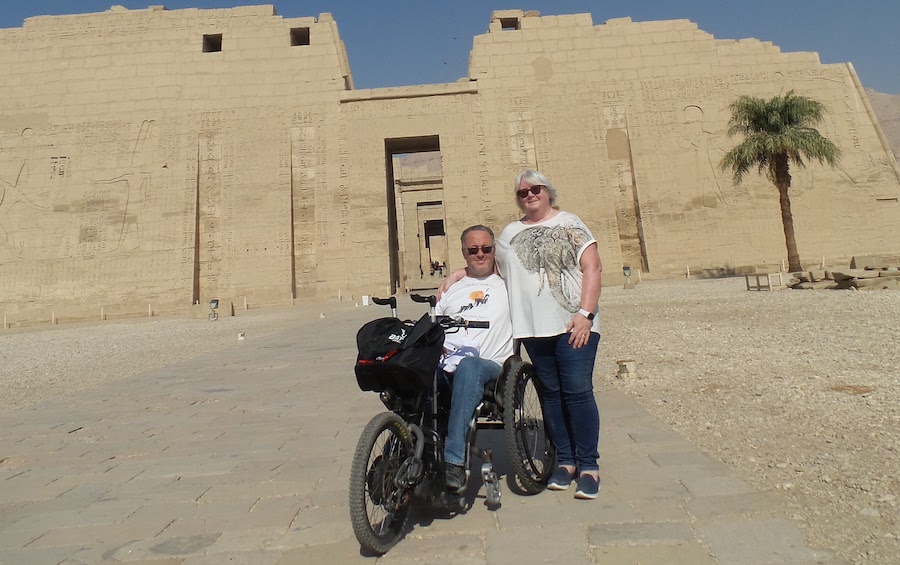A long, long time ago, I wrote a blog entry ‘The Psychology of Disability: Part One’.
The “Part One” may have eluded to the likelihood of a ‘Part Two’… …eventually!
I kind of had a rough idea about what I wanted to say, I just didn’t know how. I didn’t have a context that wouldn’t risk sounding preachy, or dismissive of the challenges other people may have faced and be facing. Some time ago, before I acquired a disability myself, I was in a discussion at my then work, a charity that supports people who have physical disabilities. I think it would have been at the time of the Beijing Paralympics. This was probably the first time that the country had embraced the Paralympics as ‘real sport’. The person I was speaking to was a disabled person. He said “the problem with the Paralympics is it is full of super-crips [cripples]. The public then think that all disabled people can do that, if only they try hard enough.”
Clearly, the reality of that would be to suggest that equally, every non-disabled person could get to the Olympics if they too also tried hard enough.
But I understood what he was saying.
And that’s what I don’t want this blog to be. THAT. I know that there are a great many reasons why other people won’t achieve what I have, and I certainly am not suggesting that it is because they haven’t ‘tried hard enough’ or ‘wasted their opportunities’.
“You’re an inspiration”…
Really? I’ve had this said to me many times. Really? An “inspiration”? On a couple of occasions, when feeling mischievous or just ‘that way out’, I’ll excitedly respond “oh great! What have I inspired you to do?”
“Err…” the well meaning person will generally stammer… while scrambling for something, ANYTHING to respond with… “I mean… when my life is tough I think of you and how you’ve handled things”.
I’ll leave them dangling for a moment, then reply in a dejected manner… “So you are saying, when your life is tough, you can at least think, your life isn’t as bad as mine and that helps you?”
“No!!! No, no, that’s not what I mean!”
Then I’ll laugh and tell them I’m winding them up! I know what they ‘mean,’ and that they mean it as a compliment. I just don’t ‘agree’, unless ‘something’ changed in their life…
If ‘how I’ve coped’ has inspired someone to actually ‘do’ something, to travel, to volunteer or befriend a disabled person, to fundraise, or if I’ve actually helped to motivate someone when truly faced with adversity, or simply, in some small way, helped someone to cope with their disability, then fantastic! Tell me, I will be so proud of you. Possibly even, proud of both of us?
But I haven’t done anything special. I’ve just ‘got on with it’.
If my ‘getting on with it’ helps someone else when faced with their personal challenges, then great. If someone else has acquired a disability, and my story helped to motivate them, then I’ll definitely take that as a win. If that person tells me that I have “inspired” them to face their disability and ‘get on with it’ too, then I’ll be delighted.
This isn’t intended to be me, a super-crip, it is me ‘getting on with it’ the best I can.
The most important psychological ‘tricks’ are mentioned in the first part. In particular, when asked “how are you?” Immediately remembering the very lowest point after acquiring the disability and comparing ‘now’ with ‘that point’, because by definition, compared to the lowest point, you are doing well.
Sexy Stockings! Learning How to Walk in Rehab.
I’ve shared this with people for a while now. I spoke with someone who had suddenly acquired a disability. They lost their home, their job, their income, their relationship. They were, not surprisingly depressed and feeling like their life was over. They gave up. When we spoke, they recalled their worst moment and used that as an anchor to refer back to. Some months later, they had moved to an accessible flat and were living independently. They told me that this ‘trick’ had been the single most important piece of advice anyone had given them. Simply being able to reply, ‘I’m doing well thanks’ motivated them enough to move forwards.
Don’t get me wrong, I’d still rather be able to walk and would have preferred it if none of this had happened to me. But it did, so… when life gives you lemons, make lemonade.
I also had my imaginary friend in Aleppo. The war in Syria was just heating up and coming to the attention of mainstream media. The bombings had begun in earnest. It’s perhaps fitting that I write this while in Egypt, thinking about the human catastrophes that keep being played out in the Middle East. I was in rehab. I would consider ‘my imaginary friend’ every time I needed motivation… …inspiration. If rehab was hard work (it was) and I’d feel like giving up (I did) then I’d think about him and his acquired disability. Simply going about his life when the bombs came. While the bodies were counted and reported, those people who acquired ‘life changing injuries’ were barely noticed outside of their own, very real world. I’d picture him, lucky to have been given a battered, old wheelchair. Always one of those with solid rubber tyres. No physio or Occupational Therapy for my friend. No financial support. No hand controls on a car. He was on his own, from bread winner to the burden on his family. And still the bombs come.
You shouldn’t compare yourself to others, but sometimes it helps to feel ‘lucky’. I recognised that I had an opportunity that so many people would crawl over broken glass to get to.
And I’d go to my physio session, or OT session, or simply push myself that bit harder again. To do my exercises even though they were painful and difficult, because not taking the opportunity, to waste it, would have been an insult to my ‘friend’. I wonder how he’s got on?
Today, 31st October 2019, I visited the tomb of Rameses 5th & 6th in The Valley of the Kings, Luxor, Egypt. I walked down to the incredible, beautiful burial chamber.
I’m writing this from my bed at a B&B. I’m aching. My back is sore, my shoulders are painful. My wrists are sore. Have I ‘over done it’? Too right!
Will I be overdoing it again tomorrow? Probably!
In July 2013 I was still in rehab at Walton Hospital. I took some videos while I was there. It was a good way to share with family & friends how I was progressing. During an OT session, I was recorded while walking outside.
First Walk Outside, With Crutches.
That was hard work too. That left me exhausted and aching. If I get tired when walking I put weight through my sticks and grip them rather than use them for balance. This is what causes the pain.
If you have suddenly acquired a disability, or facing life changing challenges, I’ve got no idea how things will pan out for you. But I can say for sure, you can either sit in a corner and cry or you can get on with it, but you can’t ever sit in the corner and cry AND get on with it.
When I had my first physiotherapy session after acquiring my disability, that was my personal low point. Afterwards, the physiotherapist said “don’t worry, we’ll get you walking again”. I didn’t believe him. If someone had said to me after the videoed walk with the OT’s that one day I’d be filmed while walking in Rameses’ tomb at the Valley of the Kings, I wouldn’t have believed them either.
The Tomb of Rameses 5th & 6th
The first few months of rehab are the most crucial to engage in while also the toughest time to do so. If you are that person, reading this, I can’t tell you how much you’ll recover or how this will all pan out. But right now, neither can you. And what I can say without any doubt is that the more you are able to engage in your rehab, the more stubborn, determined & optimistic you are, the better your outcomes will be.
Who knows, one day you may be swimming in the River Nile or whatever your dream is?
PLEASE!!!
If you have acquired a disability and are struggling, don’t feel that you should achieve what I’ve achieved. There are many reasons why people cannot do what I’ve done. The intention of the blog is not that people compare themselves with me, but that they don’t give up hope. I have often said that I was very lucky with my disability. Two massive things.
Firstly, I was in a position where I could quickly return to work. I managed services that supported physically disabled people, so I could return to work as a wheelchair user. My offices were accessible, the toilets were accessible. For five years, I was able to work full time, while my legal case was settled. That means that I’m financially able to do these things. I’m acutely aware that the experience of most disabled people is that they are financially challenged. No matter what else, if you are barely getting by financially, then you cannot go on fancy holidays. But you may be able to do other fulfilling things? Perhaps volunteering or befriending? Whatever, the point I hope people take is to remain positive & optimistic no matter what.
Secondly, I was extremely fortunate that I am not in chronic pain. I will get pain when I over do it, but in general, I am pain free. There are four ‘red flags’ to Cauda Equine Syndrome (‘CES’).
- Loss of movement in lower limbs.
- Change in sensation in one or both lower limbs.
- Saddle anaesthesia (a ‘numb bum’)
- Severe pain in lower back &/or lower limbs.
I experienced three of the four. The one I am fortunately missing is ‘pain’ because pain is so debilitating. It impacts upon all aspects of life. It stops people from sleeping or moving. I know that if I was in severe pain, I would not have achieved what I have.
If you have CES or any disability, or indeed, you don’t have a physical disability but you are facing a tough time or extreme challenges, then please try not to give in, remain hopeful & optimistic and find people who you can talk to.


